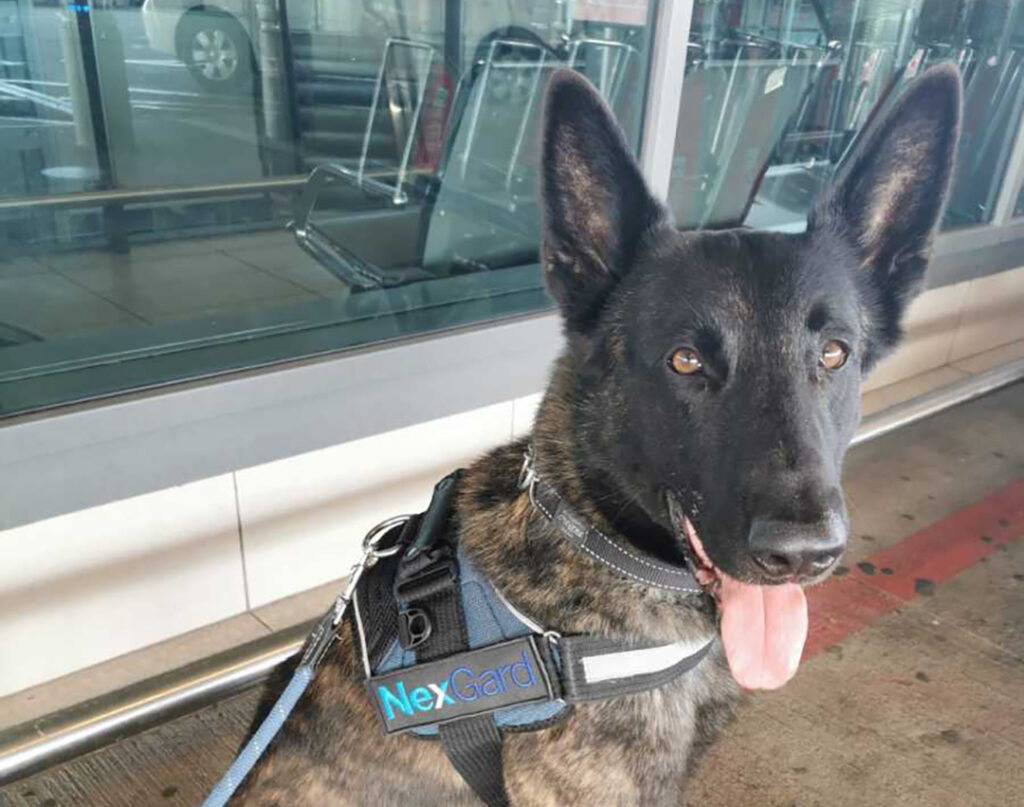ADF STAFF
In a building near O.R. Tambo International Airport in Johannesburg, South Africa, a Labrador retriever named MacGyver shows off his detective skills in a demonstration that takes only seconds.
Trained to smell the difference between sweat samples from patients who are positive and those who are negative for COVID-19, MacGyver stops and sits in front of the positive sample in every test, his mouth watering as his 100% accuracy is rewarded with a treat.
“COVID has got a very particular smell,” South African endocrinologist Tess van der Merwe told eNews Channel Africa TV. “It’s because it secretes very specific volatile carbons.”
As the pandemic lingers in many parts of the world, canine detection is being tested as an inexpensive and simple way to screen for the disease.
In South Africa, RAPS K9 Law Enforcement, a private security company that deploys dogs to sniff out illegal drugs and explosives at airports, also is teaching them to detect COVID-19.
In 2021, RAPS said it was ready to deploy its dogs to South African airports, but head trainer Gideon Treurnich said there are different approaches to consider.
“One is to physically sniff the passengers,” he told Voice of America. “The other method of deployment is where you ask the passengers for a sweat sample.”
In an update to ADF, Treurnich said that although the dogs were able to detect positive samples with 93% to 96% accuracy, funding constraints and bureaucratic hurdles have prevented the project from being used in a public setting.
“Although we could not deploy our dogs operationally, all was not in vain. We gained a lot of knowledge in a new field and know exactly how to approach this kind of training,” Treurnich told ADF.
Numerous studies have confirmed the efficacy of trained dogs in screening for the disease.
The latest, a French preprint study posted on medRxiv website March 8, showed that dogs were 97% accurate at detecting the sweat of volunteers infected with COVID-19 and 100% accurate at detecting infection in the sweat samples of asymptomatic volunteers.
They also identified sweat samples from volunteers who were not infected 91% of the time and were 94% accurate at ruling out the infection in people without symptoms.
“Canine testing is non-invasive and provides immediate and reliable results,” the study’s authors wrote. “Further studies will be focused on direct sniffing by dogs to evaluate sniffer dogs for mass pre-test in airports, harbors, railways stations, cultural activities or sporting events.”
Dogs have been used elsewhere in the world to detect COVID-19, from Finland to Thailand. South Africa wouldn’t be the first country on the continent to use COVID-sniffing canines; Rwanda launched a pilot program in June 2021.
RAPS believes dogs could be an important tool at high-traffic sites such as train stations and airports.
“The virus is not just going to disappear,” RAPS Director of Operations Robbie Roberts told VOA. Training dogs “is a long-term process anyway to make sure it is successful. From there we can expand into other countries in Africa.”

